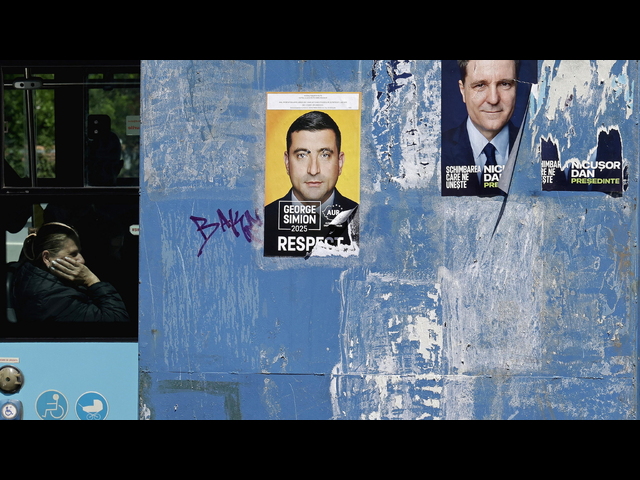
(ANSA-AFP) - BUCHAREST, MAY 15 - After comfortably topping the first round of Romania's rerun presidential election, far-right leader George Simion will face a centrist mayor in the second round on May 18. Simion, a fan of US President Donald Trump who was once active as a football hooligan, is known for his fiery speeches. He is the polar opposite of his reserved rival, Nicusor Dan. Both men will be vying on Sunday for the top post, which holds significant sway in foreign policy. - 'MAGA' candidate - Simion, who heads the nationalist AUR party, was a candidate in last year's presidential vote, which was annulled over claims of Russian interference. He came fourth with around 14 percent. Fellow far-right candidate Calin Georgescu topped the cancelled November ballot but was barred from taking part in the rerun. Campaigning on a promise to put Romania first, Simion almost tripled his score in the first round of the rerun, taking 40.9 percent of the vote. An avowed fan of Trump, whose inauguration he attended, Simion often dons a cap featuring the US president's slogan "Make America Great Again" and has said he hopes to become Romania's "MAGA president". If he does become head of state, Simion has said he will set up an alliance of nations within the European Union together with his role model, Italian Prime Minister Giorgia Meloni, and seek to strengthen ties with the United States. Well versed in social media and always smartly dressed, the father of a young boy likes to share glimpses of his family life online. After emerging on the political scene due to his radical stance against anti-Covid measures, Simion says he rejects the "far-right" label. The 38-year-old has also repeatedly alleged election fraud, echoing Trump's own unfounded claim about the 2021 US election that he lost. Simion reiterated these claims in the first-round vote, alleging numerous irregularities. He has branded the constitutional court's decision to annul the election and the subsequent barring of Georgescu as a "coup d'etat". As proof of his loyalty to Georgescu, Simion also refused to participate in television debates ahead of the election rerun "out of respect for the will of the people", saying that Georgescu should have been on the panel. While he has denounced Russian President Vladimir Putin as a "war criminal" and praised the NATO alliance, the EU critic opposes sending military aid to neighbouring Ukraine and wants Romania to cut support for Ukrainian refugees. Prosecutors are investigating Simion for allegedly inciting violence after calling for the "public skinning" of those who annulled last year's vote. - Pro-European mayor - For his part, Dan, the pro-European mayor of Bucharest, has campaigned on a promise to bring "change" and "honesty" to Romania in the wake of the cancelled vote. The 55-year-old mathematician, who was re-elected for a second term as mayor in 2024, has condemned as "corrupt" and "arrogant" the political establishment in power since the end of Communism almost four decades ago. The former activist fought against illegal urban development before turning to politics, a career considered too demanding by his daughter. She would like him to be at home more often, the father of two told AFP. Since first being elected mayor in 2020, Dan has prided himself for having modernised the capital's heating system and its sports facilities, while succeeding in pulling the city out of bankruptcy. Running as an independent in the presidential election, the reformer has voiced support for Ukraine and vowed to keep the country on its "pro-Western" path, urging voters to reject Simion's "isolationist" approach. Smiling from ear to ear when he found out he made it into the run-off, Dan took ample time to address his jubilant supporters. His rival, by contrast, ignored the media and released a pre-recorded video message. Dan is known for carefully weighing his words and for his reserved nature. He has been criticised for lacking decisiveness and not taking a clear stance on LGBTQ issues, at a time when the LGBTQ community is facing rising hostility in central and eastern Europe. (ANSA-AFP).
